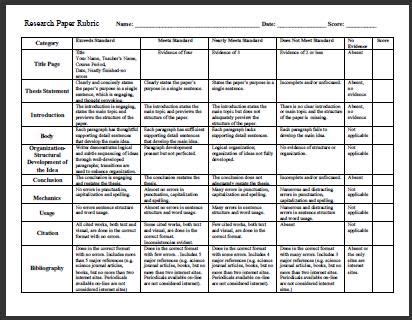Introduction
A research essay is an academic assignment that requires students to conduct original research and present their findings in a well-written and structured format. Assessing these essays presents unique challenges for educators, who must ensure that students demonstrate critical thinking, research skills, and effective writing.

This research essay rubric provides a comprehensive framework for evaluating student work, covering key aspects such as:
- Content and Research
- Organization and Structure
- Writing Style and Mechanics
Content and Research
Criteria:
- Depth and accuracy of research
- Use of credible sources
- Synthesized and analyzed information
- Original insights and conclusions
Scoring Guide:
- 5 points: The essay demonstrates a comprehensive understanding of the topic, utilizes a wide range of credible sources, and presents well-developed, evidence-based arguments.
- 4 points: The essay shows a strong grasp of the topic and utilizes reliable sources, but may lack in-depth analysis or original insights.
- 3 points: The essay presents a general understanding of the topic, but may rely on limited or questionable sources. Analysis and conclusions are basic.
- 2 points: The essay demonstrates a superficial understanding of the topic and uses unreliable or outdated sources.
- 1 point: The essay shows a lack of understanding or effort, providing little or no evidence of research.
Organization and Structure
Criteria:
- Clear introduction with a strong thesis statement
- Logical flow and organization
- Effectivetransitions
- Appropriate use of headings and subheadings
Scoring Guide:
- 5 points: The essay presents a clear and concise introduction with a well-defined thesis statement. The organization is logical and easy to follow, with smooth transitions. Headings and subheadings enhance the structure and readability.
- 4 points: The essay has a clear introduction and thesis statement, but may lack some organization or flow. Headings and subheadings are generally used effectively.
- 3 points: The essay presents a basic structure, but may have some disorganization or weak transitions. Headings and subheadings are used occasionally.
- 2 points: The essay shows a lack of organization and coherence. Transitions are unclear or non-existent. Headings and subheadings are used inappropriately or not at all.
- 1 point: The essay is disorganized and difficult to read. The thesis statement is absent or poorly defined.
Writing Style and Mechanics
Criteria:
- Clarity and conciseness
- Correct grammar, punctuation, and spelling
- Academic language
- Effective use of evidence
- Proper citations and formatting
Scoring Guide:
- 5 points: The essay is written in a clear and concise style, with correct grammar, punctuation, and spelling. It uses academic language appropriately and incorporates evidence effectively. Citations and formatting are accurate and consistent.
- 4 points: The essay demonstrates good writing skills, but may have occasional grammatical or structural errors. The use of evidence is generally effective, but citations may be inconsistent.
- 3 points: The essay is generally clear and coherent, but may include some grammatical errors or stylistic weaknesses. The use of evidence is adequate, but citations may be incomplete or inconsistent.
- 2 points: The essay shows substantial grammatical or stylistic errors, making it difficult to read and understand. The use of evidence is weak or non-existent. Citations are inaccurate or missing.
- 1 point: The essay is poorly written and lacks basic grammar and mechanics. The use of evidence is deficient, and citations are absent or incorrect.
Tips and Tricks
- Start early: Give yourself ample time to research, write, and revise your essay.
- Break down the task: Divide the writing process into smaller, manageable chunks to avoid feeling overwhelmed.
- Use a research plan: Outline your research questions, identify potential sources, and create a timeline to track your progress.
- Read critically: Evaluate the credibility of sources and extract the most relevant information.
- Develop a strong thesis statement: State your main argument clearly and concisely.
- Organize your essay logically: Use an introduction, body paragraphs, and a conclusion to present your research and arguments.
- Cite your sources properly: Use a consistent citation style to avoid plagiarism and give credit to your sources.
- Proofread carefully: Check for errors in grammar, spelling, and punctuation before submitting your essay.
Common Mistakes to Avoid
- Plagiarism: Failing to cite sources or using another’s work as your own.
- Lack of focus: Deviating from the main topic or presenting insufficient evidence to support your claims.
- Weak thesis statement: Stating a general or unsubstantiated argument.
- Poor organization: Presenting ideas in a jumbled or confusing manner.
- Incorrect grammar and mechanics: Making errors in grammar, spelling, or punctuation.
- Overuse of quotes: Relying heavily on direct quotes from sources instead of paraphrasing and analyzing information.
- Insufficient research: Failing to conduct adequate research or using unreliable sources.
- Lack of original insights: Simply summarizing sources without adding your own analysis or interpretations.
FAQs
-
What is the purpose of a research essay rubric?
To provide a clear and objective framework for assessing student essays, ensuring consistency and fairness in grading. -
How should I use the rubric?
Use it as a guide to assess your essay against specific criteria and identify areas for improvement. -
What is the difference between content and organization?
Content refers to the research and arguments presented in the essay, while organization refers to the structure and flow of the essay. -
How do I improve my writing style?
Read widely, practice writing regularly, and seek feedback from peers or instructors. -
How can I avoid plagiarism?
Cite all sources properly using an accepted citation style, and use quotation marks to indicate direct quotes. -
What is the recommended length for a research essay?
The length will vary depending on the assignment, but typically ranges from 5-15 pages. -
How long should I spend revising my essay?
Allocate at least as much time to revising as you do to writing the first draft. -
What are some common mistakes to avoid?
Plagiarism, lack of focus, weak thesis statement, poor organization, incorrect grammar and mechanics, and insufficient research.
